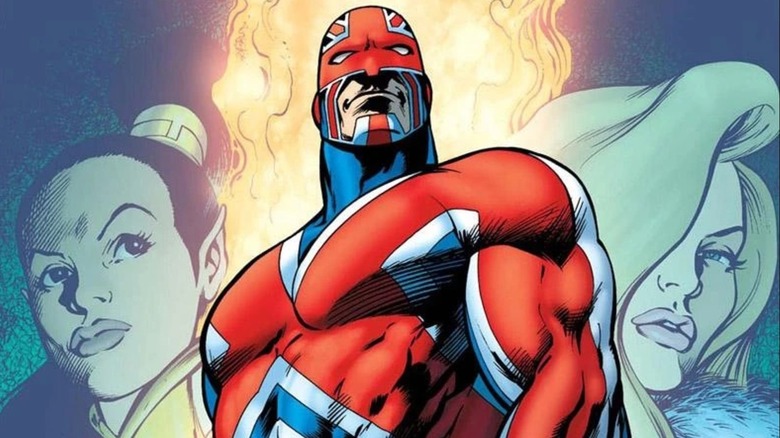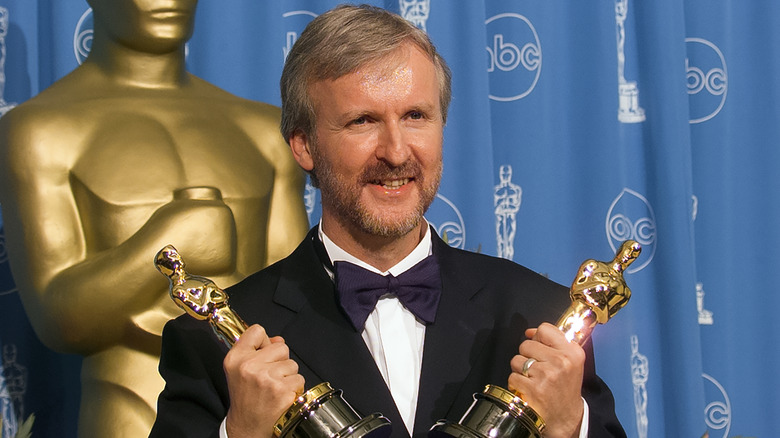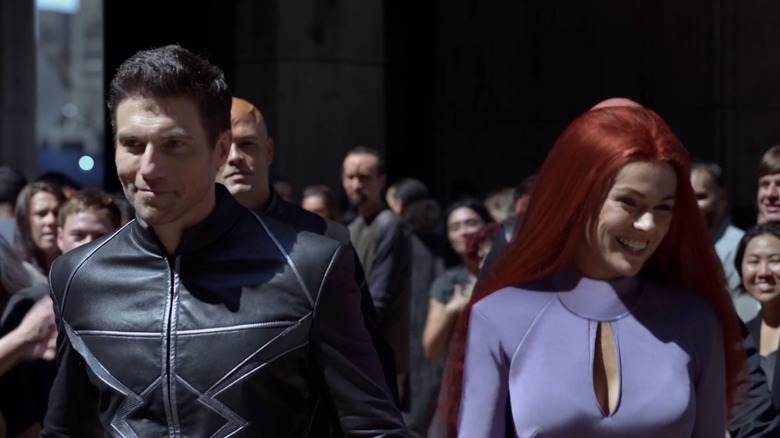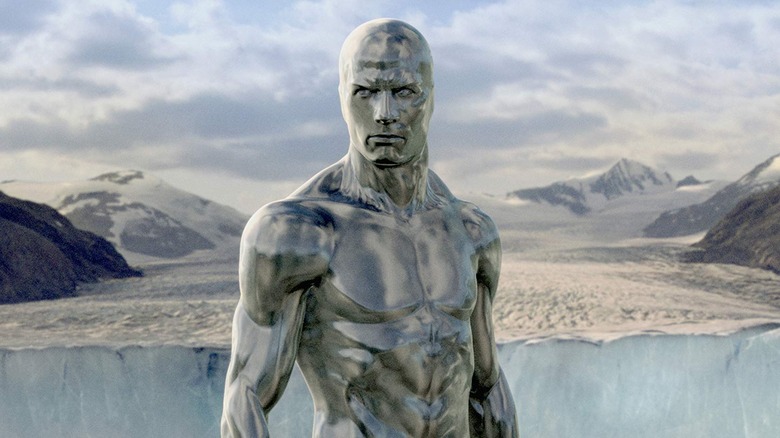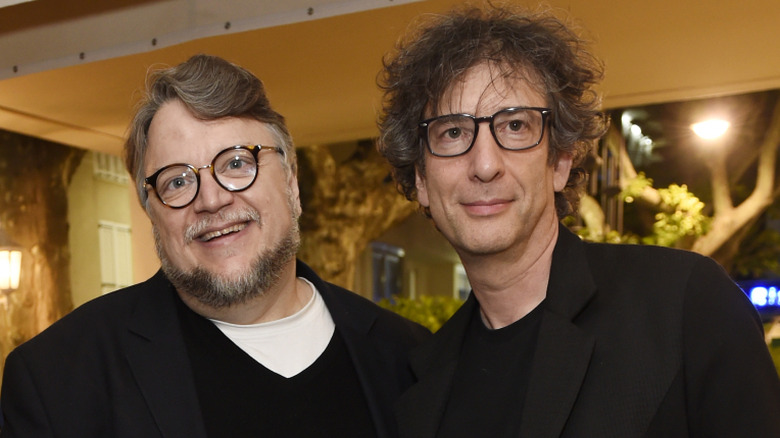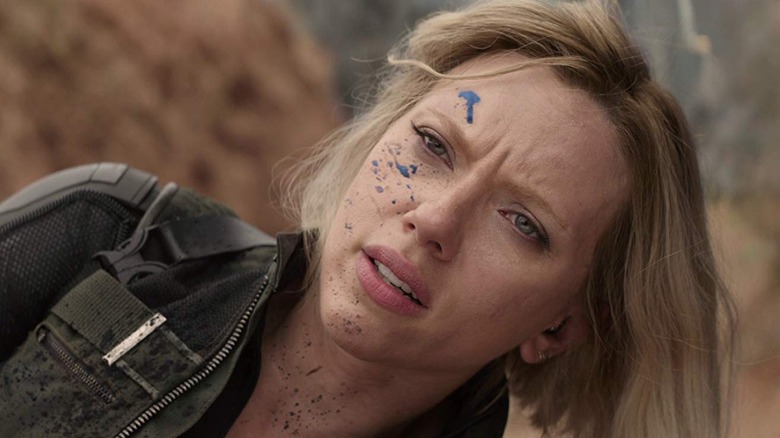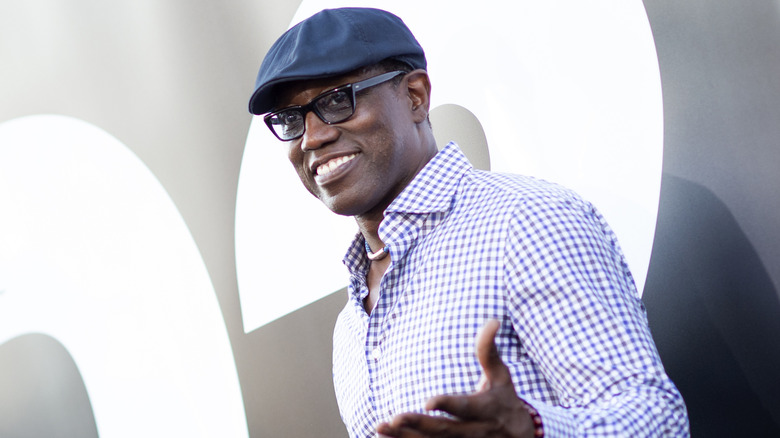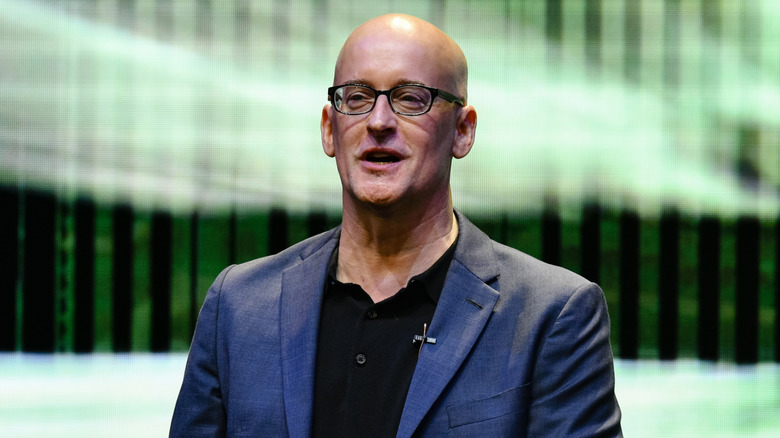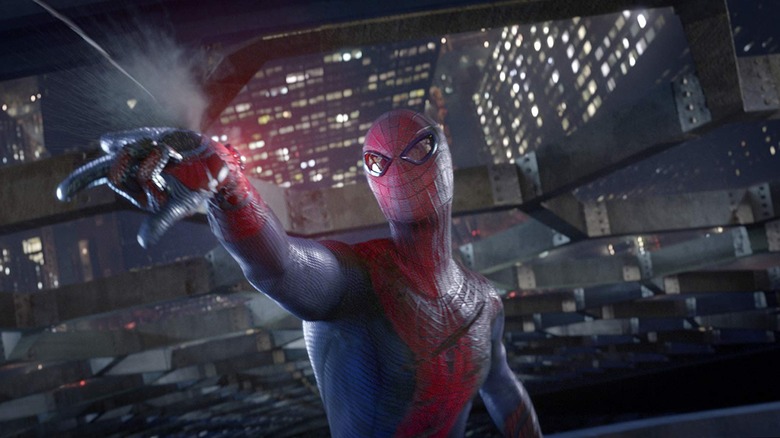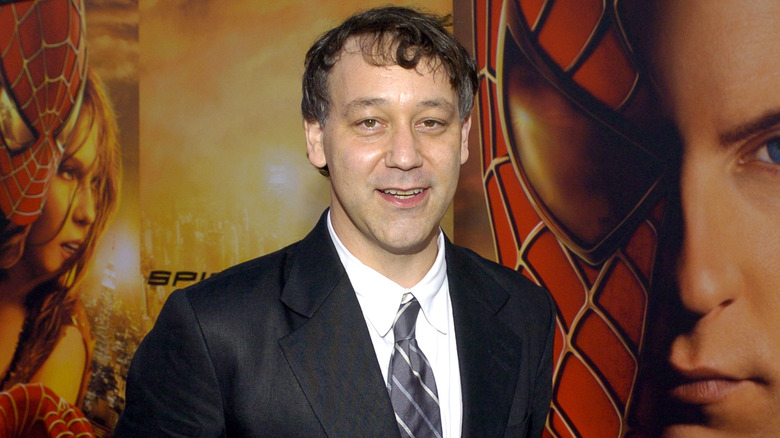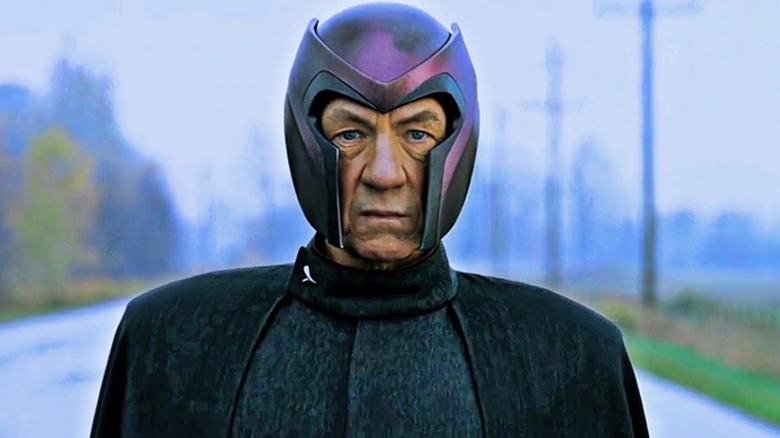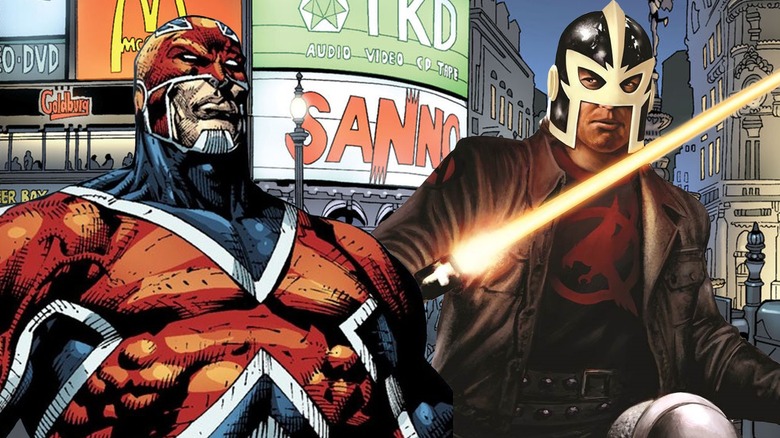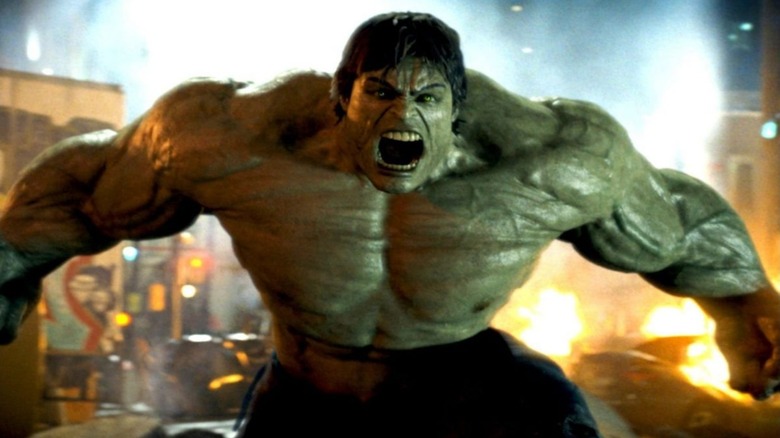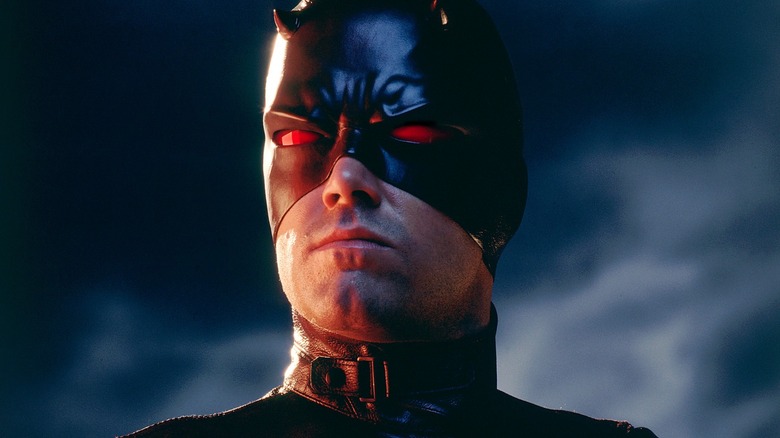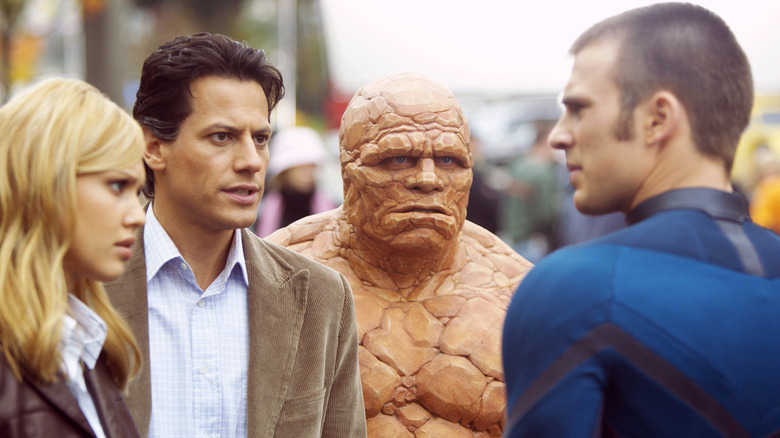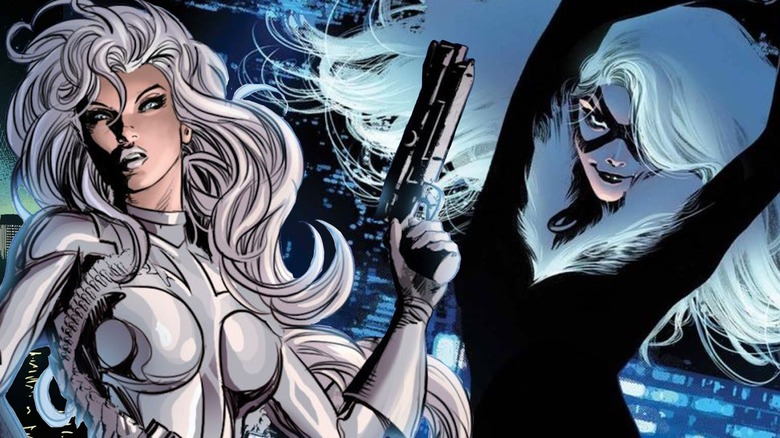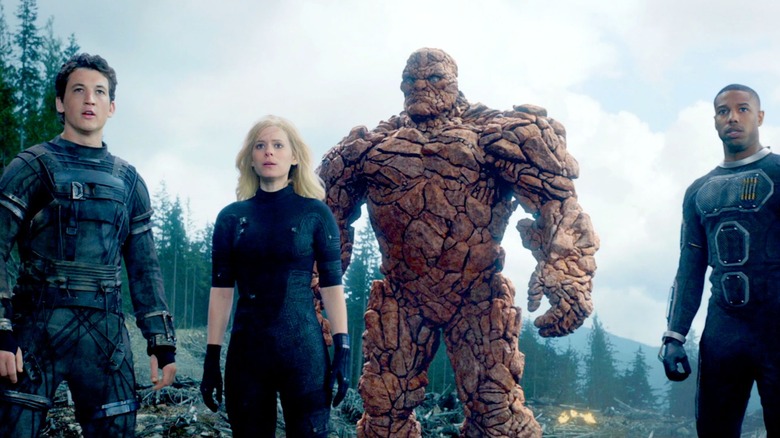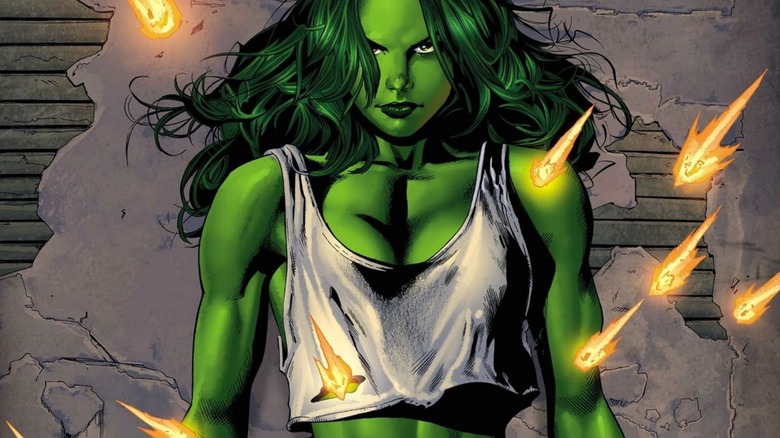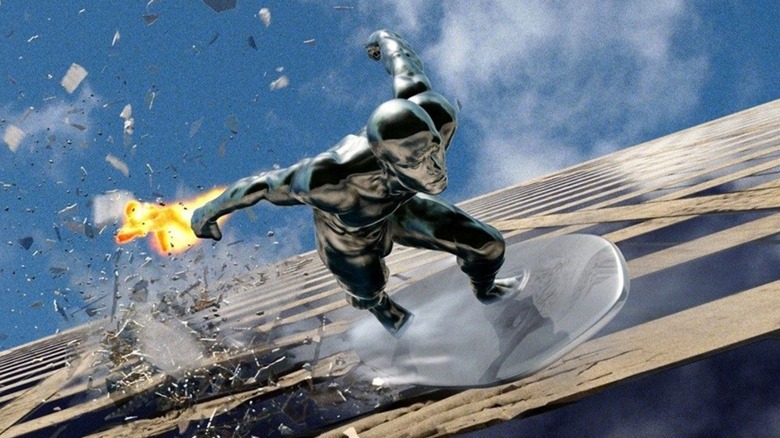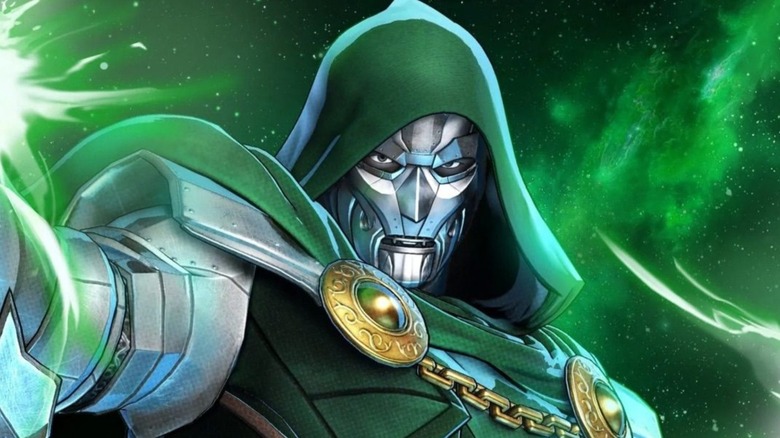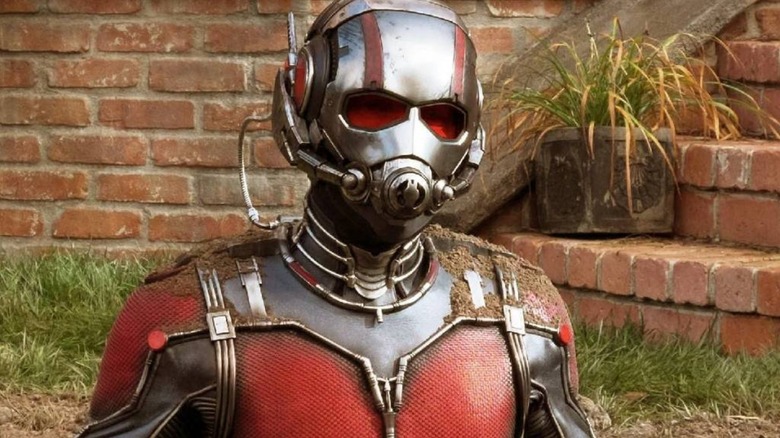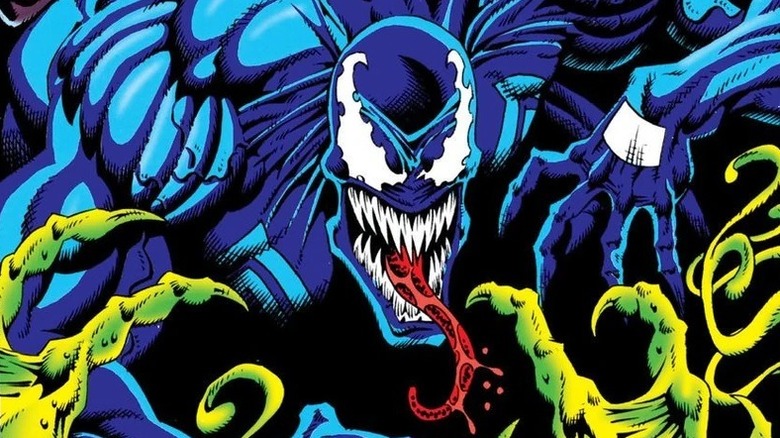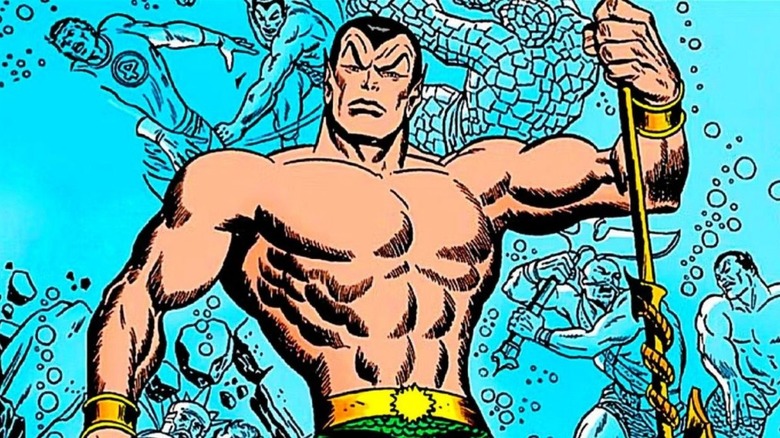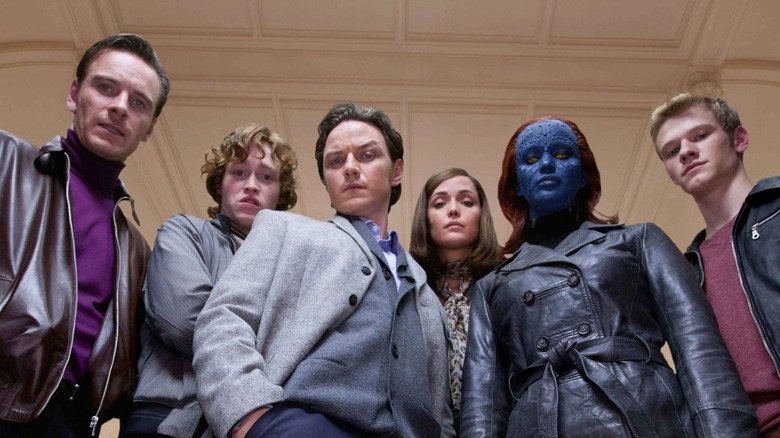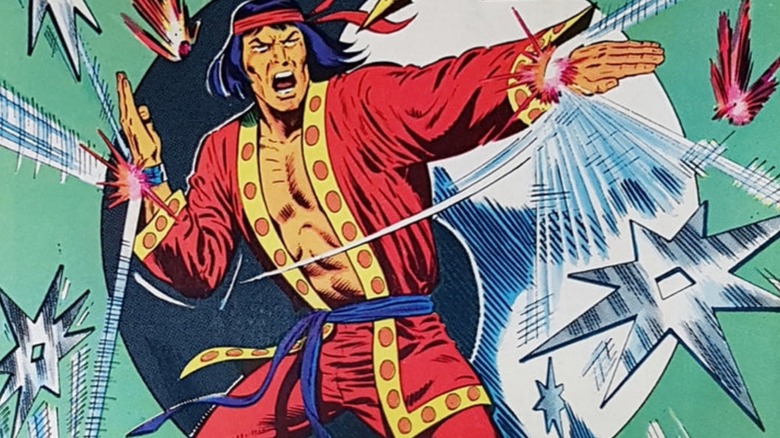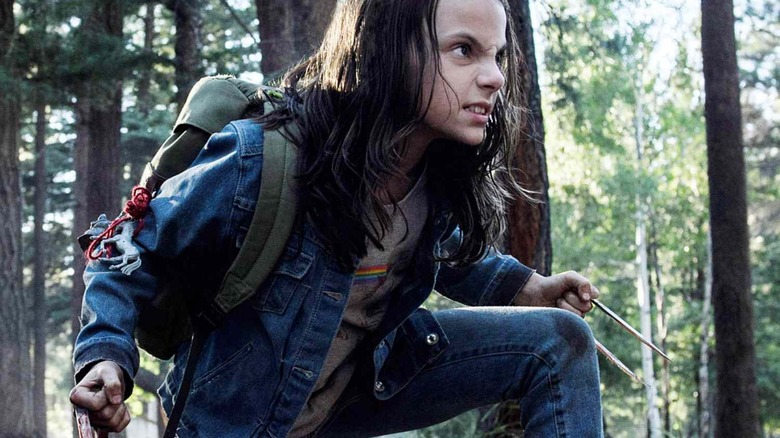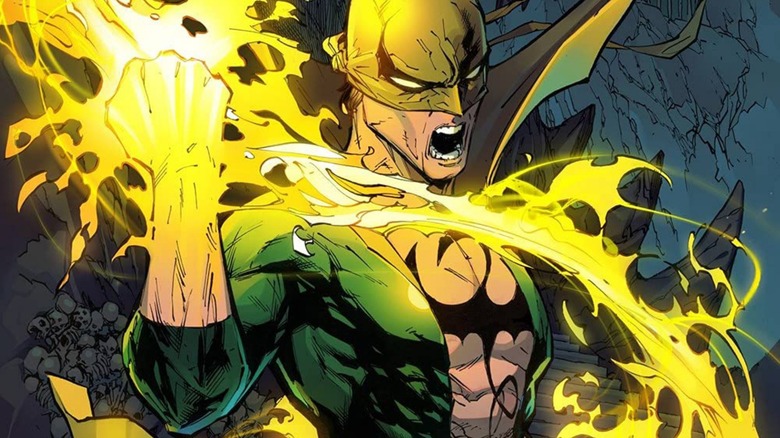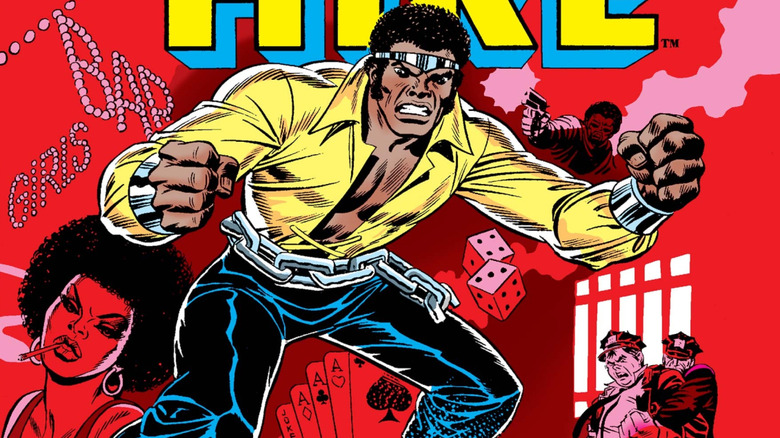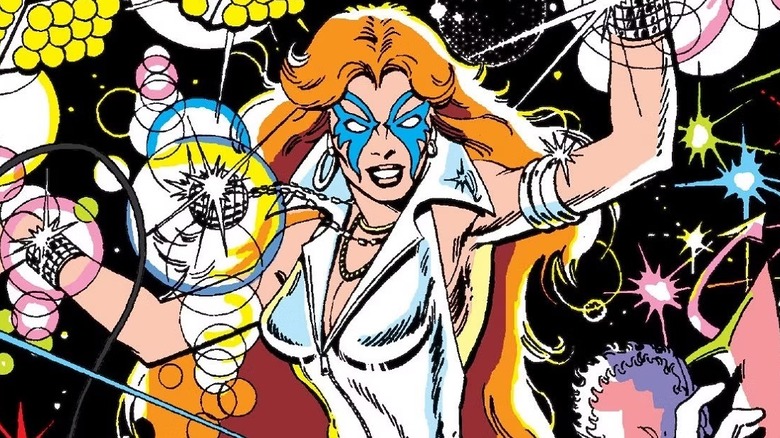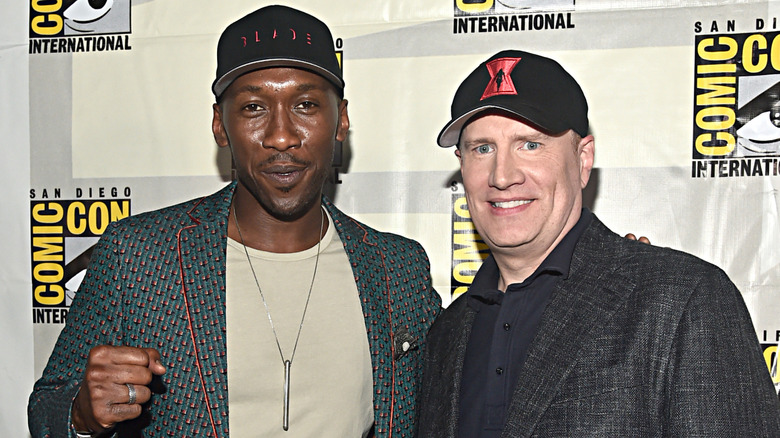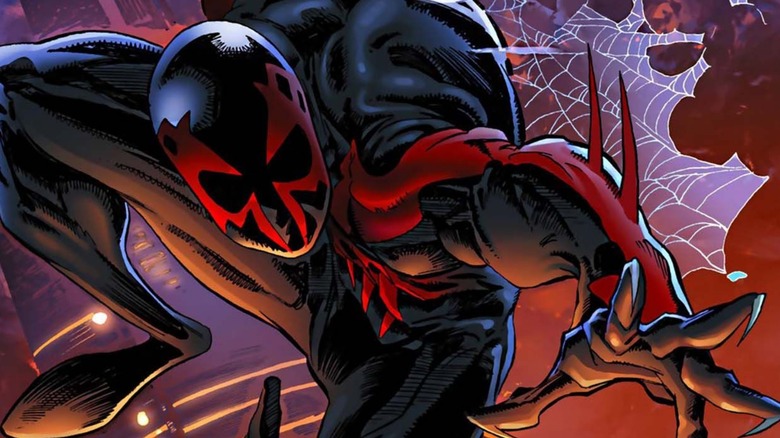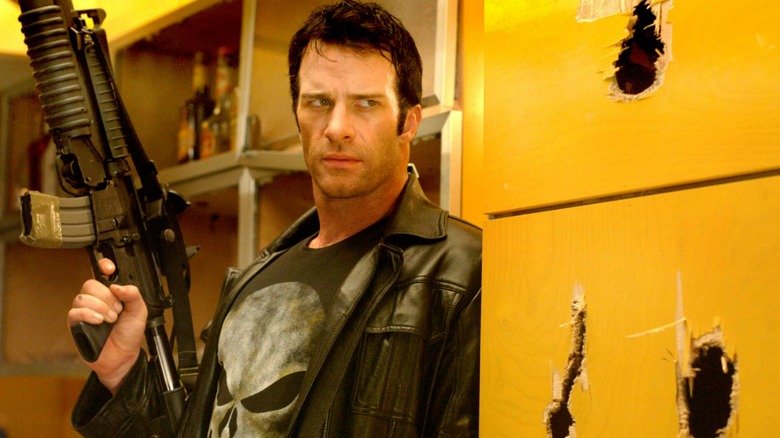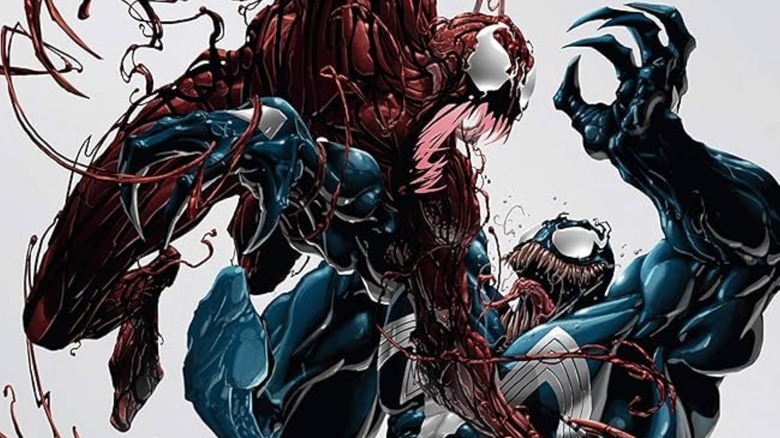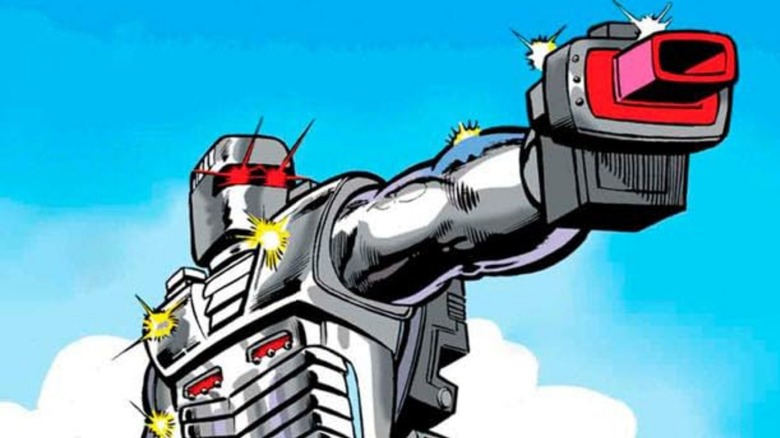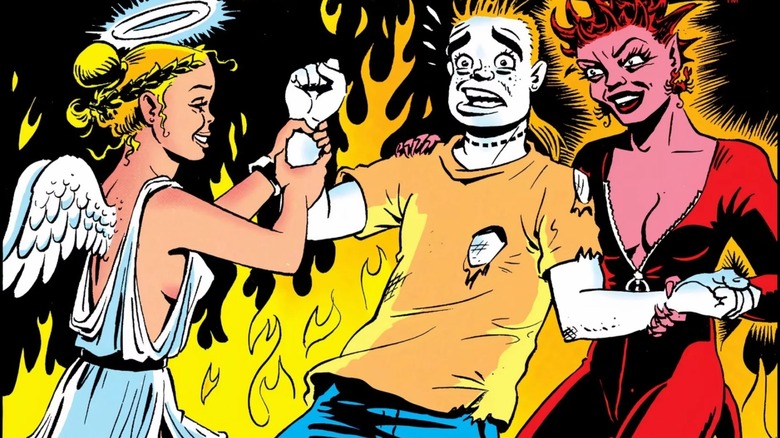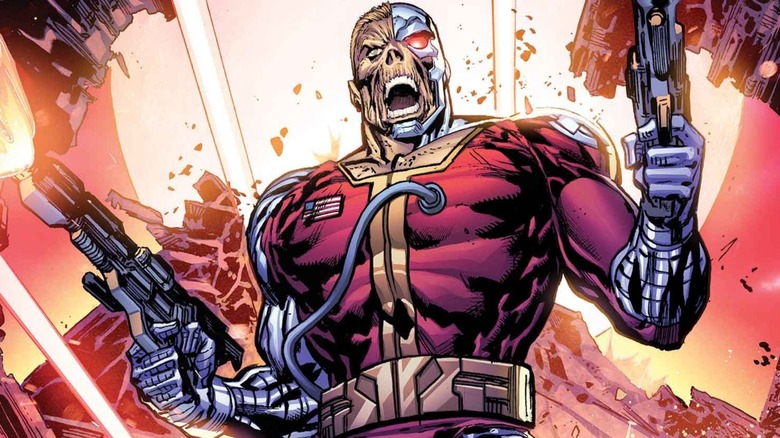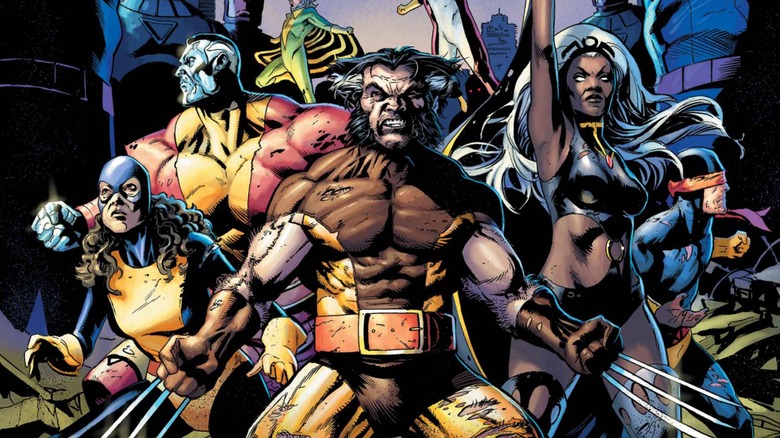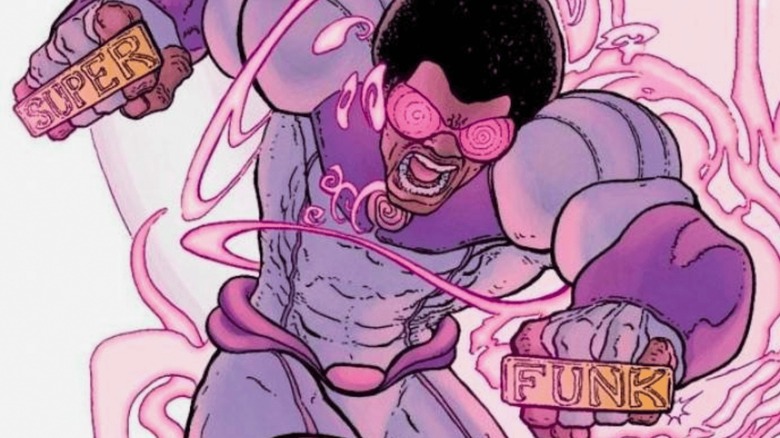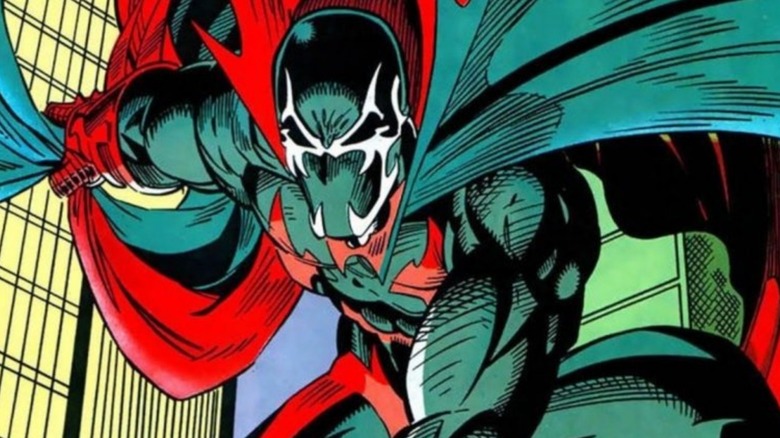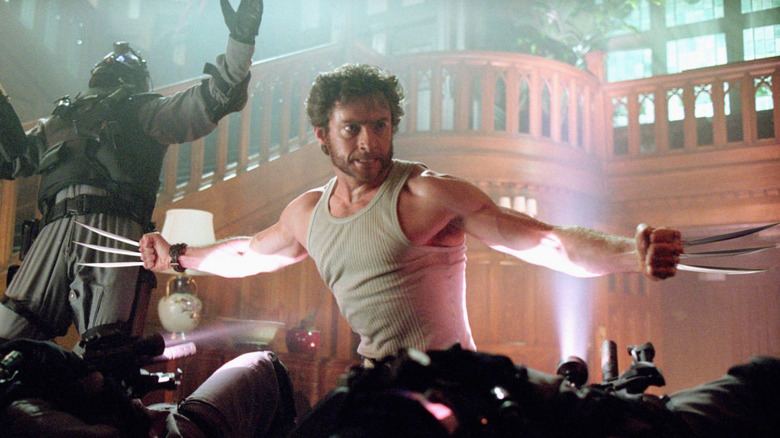Canceled Marvel Movies We'll Never Get To See
While it's true that 2024's "Deadpool & Wolverine" blew everyone away at the box office, raking in over a billion dollars, it's no secret that superhero fatigue has led to a downturn in fortunes for comic book films in recent years. You need look no further than the disappointing "Captain America: Brave New World" for confirmation that Marvel Cinematic Universe movies are no longer the events they were in the past — the fourth standalone "Captain America" film is among the worst-rated and lowest-grossing MCU entries to date.
This represented a continuation of a worrying trend as far as Marvel Studios is concerned. 2023's "Ant-Man and the Wasp: Quantumania" and "The Marvels" were both box office duds, and, despite the fact that 2025's "Thunderbolts*" did well with critics, it still failed to pull in the big bucks. Things are even more alarming over at Sony, which has seen its Spider-Man Universe crash and burn in spectacular fashion. Both studios have been forced to can Marvel projects for one reason or another, though this isn't actually a new phenomenon.
Marvel began trying to make movies about its comic book heroes way before the MCU was a thing, and there's a long history of films that entered production only to stall and eventually vanish. From bizarre flicks about obscure characters to tentpole blockbusters that got derailed, we've taken a deep dive into the canceled Marvel movies you'll never get to see.
James Cameron's Spider-Man
In the '90s, James Cameron convinced Carolco Pictures (the backers of Cameron's "Terminator 2: Judgment Day") to buy the film rights to Spider-Man and started a script for the film. In an interview with Collider, Cameron recalled, "I was going to launch that as a series of films. I wrote quite an extensive treatment — I think eighty or ninety pages long..." After Carolco Pictures went under, the rights to Spider-Man were purchased by Sony. Because Cameron had moved on to other projects (notably "Titanic"), he didn't pursue the project further.
According to Rebecca Keegan, author of "The Futurist: The Life and Films of James Cameron," this Spider-Man would have been an origin story with some key changes to the familiar comics lore. Notably, instead of his wrist shooters being constructed, Spider-Man would grow them naturally. In an excerpt, Cameron described his rationale: "I said, wait a minute, he's been bitten by a radioactive spider, it should change him fundamentally in a way that he can't go back." This element, of course, would eventually make it to Sam Raimi's 2001 film, becoming a controversial decision among fans.
Cameron's script would be more adult-themed than most takes on the webslinger, with some decidedly intense language and sexuality. Concept art showcased the edgy tone, revealing gritty, even unsavory imagery like Peter Parker peeping on Mary Jane Watson undressing. The art also hints that the villain Electro would have been featured as a central antagonist.
The Inhumans
A movie featuring the Inhumans, a lesser-known group of alien heroes, was announced by Marvel Studios president Kevin Feige in 2014. According to Feige, the film was meant to be part of Phase 3 of the Marvel Cinematic Universe. Two years following the original announcement of the film, Feige told Collider an Inhumans movie was still going to be made and that it was "only a matter of when." As fans waited for further news, the target release date was shifted from November 2018 to July 2019, before disappearing from the studio's release schedule altogether.
Eventually, Marvel decided that TV would be a better fit for the characters, resulting in a unique release strategy that saw "The Inhumans" debuting both on ABC and theatrically on IMAX screens. The experiment — overseen by Marvel Television, a separate entity from Marvel Studios and the MCU — was not a success. The series was critically panned and canceled after a single season. It's safe to say that the MCU version of the characters would have been fairly different... and equally safe to assume we won't be seeing that take any time soon.
Silver Surfer: The Musical
The Silver Surfer is a cosmic entity with the ability to travel at the speed of light on his cosmic surfboard. Best known as the herald of Galactus, he's appeared in many comics over the years, but in the '80s the Silver Surfer took an unexpected foray into the musical genre.
Lee Kramer, the executive producer for the film "Xanadu," expressed interest in making a Silver Surfer rock musical. According to Sean Howe's book "Marvel Comics: The Untold Story," Kramer said of the project, "We're going to make an epic picture on the scope of '2001: A Space Odyssey' with the kind of soundtrack that that film had, only using contemporary rock and roll."
The film would have starred Olivia-Newton John, fresh off of "Xanadu" herself, but she wasn't the only big name attached to the project. Paul McCartney was asked to contribute to the soundtrack, a reasonable request considering that the ex-Beatle is an avowed Marvel fan who even wrote a song about Magneto and Titanium Man.
Ultimately, the project fell through, and we wouldn't see the metallic hero on the big screen until 2007's "Fantastic Four: Rise of The Silver Surfer." As for Kramer's musical, it's pretty safe to say that Marvel won't be making anymore stage shows after "Spider-Man: Turn Off the Dark" failed to amaze theater patrons.
Guillermo del Toro and Neil Gaiman's Doctor Strange
In 2008, writer Neil Gaiman told Premiere that he had been interested in creating a film centered around Doctor Strange. Gaiman approached director Guillermo del Toro with the concept, and according to Gaiman, he was interested. In an interview with Collider, Gaiman explained that while del Toro was on board, the film was likely around four years from entering production, due to his busy schedule.
Regarding the project, del Toro told Empire, "That's an interesting character because you can definitely make him more in the pulpy occult detective/magician mold and formula than was done in the 'Weird Tales,' for example... the idea of a character that really dabbles in the occult in a way that's not X-Filey, where the supernatural is taken for granted. That's interesting... but I wouldn't use the suit!"
Ultimately, Gaiman and del Toro never got to make their version of 'Doctor Strange.' Marvel wasn't interested in taking on the project, waiting to introduce the Master of the Mystic Arts to movie audiences until Scott Derrickson's 2016 film starring Benedict Cumberbatch.
David Hayter's Black Widow
Made famous by Scarlett Johansson's portrayal in the Marvel Cinematic Universe, Black Widow has become a bigger fan favorite than ever after decades of foundational comic stories. Her first solo movie, which dropped in 2021, is not the first time that Marvel has tried to show audiences this former Russian spy's backstory.
Though many people know David Hayter as the voice of Solid Snake in the "Metal Gear Solid" series, he has also had a successful career as a screenwriter. In a 2014 interview with Latino Review, Hayter revealed that he had written a "Black Widow" script ten years prior, and was even attached to direct the project at one point.
Hayter alleged that the poor performance of other action films starring women (in an era defined by flops like "Elektra" and "Lara Croft: Tomb Raider — The Cradle of Life" rather than the likes of "The Hunger Games," "Mad Max: Fury Road," and "Captain Marvel" that would follow) is what caused Marvel to get cold feet and shelve his project.
Wesley Snipes' Black Panther
As DC Comics and Warner Bros. were experiencing repeated critical and financial successes with their Batman and Superman films throughout the 1980s and '90s, Marvel was having a tougher time. In 1996, the company entered into bankruptcy, but that didn't deter one actor's aspirations of bringing one of their iconic characters to the big screen.
In the mid-'90s, Wesley Snipes was coming off a string of successful movies like "New Jack City," "White Men Can't Jump," and "Demolition Man," but he had a vision for his own superhero vehicle: an adaptation of Marvel's "Black Panther" comics. However, this process was more difficult that Snipes had originally anticipated. He later told The Hollywood Reporter, "Ultimately, we couldn't find the right combination of script and director and, also at the time, we were so far ahead of the game in the thinking, the technology wasn't there to do what they had already created in the comic book."
In the end, Snipes and Marvel teamed up for a less ambitious project: The game-changing superhero-vampire movie "Blade." The 1998 film earned over $131 million, becoming Marvel's first real movie success. "Black Panther," meanwhile, was still listed as an upcoming film as late as 2000, with Variety describing the project as a vehicle for "a Black Indiana Jones-style character, to which Wesley Snipes has long been attached to produce and star." Unfortunately for Snipes, his vision for "Black Panther" never got off the ground, though he was "ecstatic" about the eventual success of Chadwick Boseman and the MCU incarnation of Wakanda, he told Slate.
Peyton Reed's Fantastic Four
Director Peyton Reed is known for his work directing "Ant-Man" and "Ant-Man and the Wasp," but years prior, Reed had plans to create a "Fantastic Four" film. In an interview with Collider the director explained, "I actually developed 'Fantastic Four' when it was at Fox, and this would have been about 2002 or 2003. I was doing a movie at Fox at the time and they were gonna do 'Fantastic Four,' and I went in and pitched to [then Fox Filmed Entertainment CEO] Tom Rothman."
Reed stated that the film was going to be set in the '60s and would be tonally similar to the Beatles film 'A Hard Day's Night.' Notably, his take would not feature an origin story and would instead jump straight into the action. Sadly, Fox didn't have much faith in the project. According to Reed, "It felt like they sort of wanted to make a B-movie out of it. So we parted ways."
The Amazing Spider-Man 3
Sony had high hopes that rebooting its "Spider-Man" franchise with "The Amazing Spider-Man" in 2012 would be a step in the right direction after the fairly chilly reception of 2007's "Spider-Man 3." However, the "Amazing Spider-Man" films were not as fan-pleasing as Sam Raimi's first two "Spider-Man" movies.
In an interview with Den of Geek, director Marc Webb reflected on some of the issues that plagued his two "Amazing Spider-Man" films starring Andrew Garfield. "I think it was a very difficult time for Sony because of the hack and because Marvel wanted the character back," he said. "Maybe it accelerated the timeline... but that's something I accepted."
Still, Sony and the filmmakers had big plans for the webslinger, and "The Amazing Spider-Man 2" had a few allusions to their vision for the future of the franchise. However, once Sony reached a deal with Marvel to incorporate Spider-Man into the Marvel Cinematic Universe, the entire "Amazing" undertaking was scrapped so Tom Holland could make his entrance in 2016's "Captain America: Civil War."
Sam Raimi's Spider-Man 4
After "Blade" and "X-Men" got the ball rolling for films based on Marvel Comics heroes, one of the most memorable efforts to follow was Sam Raimi's "Spider-Man." Starring Tobey Maguire as Peter Parker, the 2002 film was a huge success, earning Marvel over $821 million worldwide.
That success was followed up by one beloved sequel and... another sequel that fans of the character like to pretend doesn't exist. Regardless, with so much positive momentum behind the series, Rami was ready to right the wrongs of the third movie with a fourth. In an interview with Vulture, Rami revealed, "I was very unhappy with 'Spider-Man 3,' and I wanted to make 'Spider-Man 4' to end on a very high note, the best 'Spider-Man' of them all."
Rumors swirled that the fourth installment would feature John Malkovich and Anne Hathaway as the villains Vulture and Black Cat, respectively. Despite this, a script never materialized to satisfy Rami's vision. The director told Vulture, "It really was the most amicable and undramatic of breakups: It was simply that we had a deadline and I couldn't get the story to work on a level that I wanted it to work."
X-Men Origins: Magneto
After the success of the first trilogy of "X-Men" films in the early 2000s, the executives at 20th Century Fox decided that the best route for future films in the franchise would be to focus on the individual origins of popular characters. The first mutant to get this treatment was Wolverine.
In an interview with Gizmodo, series producer Lauren Shuler Donner reported that David Goyer was slated to write and direct the next "X-Men Origins" movie, focusing on Magneto. In a 2008 Q&A with SyFy, Donner said that progress on "X-Men Origins: Magneto" would depend on the success of Wolverine's solo outing. Unfortunately, "X-Men Origins: Wolverine" underperformed at the box office and received scathing reviews upon its release in 2009, prompting the studio to pivot away from their film about Magneto and the "Origins" banner.
Despite the film not getting made, a writer for the Coventry Telegraph gained access to a draft of the script. Though it is different from a separate plot synopsis published in the trade magazine Production Weekly, both plots suggest a story that would open during Magneto's time in Auschwitz and follow him as he meets, befriends, and ultimately becomes enemies with Charles Xavier. This relationship would eventually form the core of 2011's "X-Men: First Class" and its follow-ups, but much of the more Magneto-centric story remains untold.
Avengers: The Kang Dynasty
Marvel Studios' post-"Avengers: Endgame" plan put all of its efforts toward making Kang the Conqueror (Jonathan Majors) its next big bad, but that changed. Underperforming projects like "Ant-Man and the Wasp: Quantumania" and Majors' legal issues pushed the studio in another direction, toward Doctor Doom (Robert Downey Jr.). Majors was dropped by Marvel Studios and Phase 6 efforts were entirely restructured to conclude the Multiverse Saga with different stories and characters.
"Avengers: The Kang Dynasty" would have been released on May 2, 2025, but Marvel pushed it to the following year before canceling it outright. With Majors out of the picture, the MCU will adapt different stories centered around Doom, including the 2015-2016 comic book series "Secret Wars". The fifth "Avengers" film will be "Avengers: Doomsday," which will be followed by "Avengers: Secret Wars." They'll drop on December 18, 2026, and December 17, 2027, respectively.
Captain Britain and the Black Knight
In 2018, it was reported that director Guy Ritchie was being eyed to helm a film centered around Captain Britain and Black Knight. The latter character was somewhat introduced in "The Eternals," played by Kit Harrington, and Henry Cavill has been fancast as Captain Britain online for years. The news came from a Pinewood Studios source, who seemed adamant that it was going to happen. "Space at Pinewood has been booked for November and December 2018 to hold auditions," they told Ain't It Cool. "Marvel seems to be moving fast with it to fill in the space left behind by Danny Boyle's aborted Bond 25. Everyone is excited because it looks like another few months of solid work when we thought we would have to wait a while."
News of this film came prior to "Eternals," and seeing as Harrington appeared in that movie as Dane Whitman (Black Knight), it's possible that a team-up movie with Captain Britain was indeed on the cards at some stage. However, it now seems unlikely that this project made it very far out of the early development process. Of course, being an unvetted rumor that's several years old at this point, it doesn't seem that Marvel Studios will produce a film based on these two characters, who are relatively obscure and not well known outside of dedicated fans.
Drew Goddard's Sinister Six
Sony worked hard to develop a "Sinister Six" franchise via its two "The Amazing Spider-Man" movies starring Andrew Garfield. The plan was to build off the success of those movies to launch a massive project with all six supervillains, but it was canceled before it got off the ground. There was even a planned scene in the Savage Land where Spidey would have ridden a Tyrannosaurus Rex. Director Drew Goddard called it "the epic Spider-Man movie of my dreams."
The idea was to release the movie in 2016, but it was canceled for two primary reasons: The underperformance of "The Amazing Spider-Man 2" (which teased a "Sinister Six" movie in its trailer and in its closing credits) and the complex contract Sony has with Marvel about Spider-Man and his associated characters. Sony ultimately agreed to allow Marvel Studios to use Spider-Man in "Captain America: Civil War," which sealed the fate of the "Amazing Spider-Man" film franchise. The subsequent failure of "Morbius," "Madame Web," and "Kraven the Hunter" have killed off any lingering hopes that Goddard's "Sinister Six" might be resurrected.
The Incredible Hulk 2
The Marvel Cinematic Universe launched in May 2008 with "Iron Man," and six weeks later, "The Incredible Hulk" hit theaters. By 2012, there was no sequel, and Mark Ruffalo had replaced Edward Norton as Bruce Banner, reportedly due to Norton's behavior. Initially, a follow-up was in the works, but the situation became complicated because of the incredibly complex contract between Universal and Marvel regarding Hulk's movie rights.
While Ruffalo's version of Bruce Banner has appeared in several MCU movies, if Marvel Studios were to put the word "Hulk" in the title of a movie, they would be legally obliged to split the box office with Universal. According to Ruffalo, that's why "The Incredible Hulk 2" has been derailed. Speaking to Variety, he said: "A standalone Hulk movie will never happen because Universal has the rights to the Hulk standalone movie and they don't know how to play nice with Marvel and they don't want to make money."
Daredevil 2
Ben Affleck's turn as Matt Murdock and his costumed counterpart in "Daredevil" wasn't well received when the film was released in 2003. Despite this, a spinoff, "Elektra," got the green light, leading Jennifer Garner to reprise her role as the deadly assassin. The plan was to release "Elektra," let that character have her moment in the sun, and then "Daredevil 2" would get the go-ahead from 20th Century Fox. Unfortunately, "Elektra" utterly bombed financially and critically.
As a result, plans for a "Daredevil" sequel were dropped by the studio and Ben Affleck's "Daredevil 2" was never made. The character would continue in live-action via a Netflix series that ultimately led to "Daredevil: Born Again" in the MCU, with Charlie Cox making the role his own. "Daredevil" director Mark Steven Johnson told Yahoo! Entertainment that the sequel would have focused on Matt and Karen Page's romance and that Ellen Pompeo would have reprised her role from the first film.
Fantastic Four 3
From the unreleased Roger Corman-helmed B-movie that was made back in the '90s to the ill-fated Josh Trank-directed flop from 2015, Marvel's First Family has not had an easy time of it on the big screen. The Fantastic Four are set to play a role in the Marvel Cinematic Universe going forward, but, as of this writing, the highlight of their exploits when it comes to movies is Fox's "The Fantastic Four" from 2005, which made enough money to garner a sequel, 2007's "Fantastic Four: Rise of the Silver Surfer."
Fox planned to release a threequel sometime after the sequel dropped, but that film didn't do as well as the first one, earning around $30 million less at the global box office despite an increased budget. The sequel to "Rise of the Silver Surfer" got canceled, and, though Fox hasn't explained why it made that decision, the diminishing box office returns were likely the main factor. According to Chris Evans, who played the Human Torch, he realized the franchise was dead when Fox failed to follow-up with him following the second film. "If there were going to be a third I think a week after the second one was released we would have heard," he told MTV.
Silver & Black
Silver Sable and Black Cat are important Spider-Man characters, and Sony planned on bringing them to the big screen in a team-up film. It entered the development phase sometime after the release of "The Amazing Spider-Man 2" in 2014, which introduced Felicia Hardy (Felicity Jones), the real name of Black Cat. Production on the film under the working title "Tri-Border" was set to commence in March 2018, with the bulk of the shoot scheduled to take place in Atlanta.
According to early reports, the plot involved Silver Sable working for the government as a bounty hunter hot on the trail of Black Cat, a top-end burglar. Gina Prince-Bythewood joined the project as director and co-writer alongside scribes Lisa Joy ("Westworld") and Chris Yost ("Thor: Ragnarok"), with Sony giving the film a release date of February 8, 2019. Unfortunately, "Silver & Black" stalled and Prince-Bythewood left to direct another film. Sony canceled the team-up before killing its spinoffs entirely.
Fantastic Four 2
2015's "Fantastic Four" suffered through a problematic production, studio mandated reshoots, and director Josh Trank lashing out online at the final cut. Before the movie began filming, Fox told the world it would produce a sequel, scheduled to hit theaters on June 8, 2017. It's not uncommon for studios to plan for success and establish the framework for a sequel, but Fox jumped the gun here because that movie never manifested. The terrible box office performance and near-universal critical derision of "Fantastic Four" made the sequel a non-starter.
Fox pulled the project from its schedule in November 2015, and when Disney purchased 20th Century Fox in March 2019, the movie rights for Marvel's First Family returned home. The following year, Trank admitted that the film was "an expensive miscalculation" in an interview with Den of Geek, adding, "Was it too ambitious for me to impose such a personal take on the Fantastic Four? My answer is simply yes, it was, but how would I have known unless I had taken that swing for the fences."
Larry Cohen's She-Hulk
The Hulk has long been a popular character, and his cousin, She-Hulk, also enjoyed impressive fan engagement in the 1980s and '90s via her solo series. To capitalize on that, plans were put into motion to give the character a feature film directed by Larry Cohen. While the '90s She-Hulk movie was scrapped, it got far enough in the development process that an array of marketing materials were created.
Brigitte Nielsen was cast as Jennifer Walters, aka She-Hulk, and she received a full makeup and wardrobe fitting for promotional shots that have since found their way online. The plan was to entice investors to the project to fund the movie, but they never arrived. Investor hesitation possibly stemmed from the terrible performances of 1989's "The Punisher" starring Dolph Lundgren and the Albert Pyun-directed "Captain America," released in 1990 and among the worst comic book movies ever made.
J. Michael Straczynski's Silver Surfer
The Silver Surfer has been popular since his introduction in the 1960s, and while he's appeared in animation, it wasn't until 2007 that he found his way to the big screen. "Fantastic Four: Rise of the Silver Surfer" ended in such a way as to tease a potential Silver Surfer spinoff film, and one was indeed in the works, with famed comic book scribe J. Michael Straczynski joining the project as its writer.
Straczynski planned to pick up the story immediately after the end of "Rise of the Silver Surfer." He wrote his script and the wheels were firmly in motion, but "Rise of the Silver Surfer" underperformed at the box office, putting the franchise's future into question. Not long after its release, 20th Century Fox killed all hopes of a "Silver Surfer" movie — the same axe that felled the third Fox "Fantastic Four" film also put an end to this one.
Noah Hawley's Doctor Doom
Doctor Doom has long been a fan-favorite villain, and he's appeared in several live-action movies. While he's never had his own film, one was planned with director Noah Hawley, who announced the project at a panel at San Diego Comic-Con in 2017. Hawley developed the story, but he didn't provide much information as it was in the early stages and there were corporate changes on the horizon. During the panel, Hawley stated that while he was happily working away on the project, Fox's potential acquisition by Disney could upset his plans.
As it happened, Hawley saw the writing on the wall because the film never manifested. By 2019, Hawley had a completed script and was waiting for a call from Marvel Studios head Kevin Feige that never came. During an appearance at SXSW that same year, Hawley said, "I would love to make it. Marvel, they've got a 25,000-year plan. I just don't know if I fit into there" (via Deadline).
Edgar Wright's Ant-Man
"Ant-Man" arrived on the silver screen in 2015, but what hit theaters wasn't the original plan. Initially, director Edgar Wright was hired to direct and co-write "Ant-Man" alongside fellow screenwriter Joe Cornish. They worked on the script on and off for approximately eight years, Cornish has revealed. However, between the time they were hired and when "Ant-Man" entered production, the superhero movie landscape evolved.
The MCU became a media juggernaut and the most successful film franchise of all time, leading Wright and Cornish to leave the project. They planned on making a standalone movie without the wider MCU as a consideration, but that's not how the studio wanted to proceed. In a 2017 interview, Wright told Variety, "I wanted to make a Marvel movie, but I don't think they really wanted to make an Edgar Wright movie."
David S. Goyer's Venom
Venom has always been a popular character, with a fandom that stretches back to long before he landed a trilogy that ran from 2018 to 2024. While those films were successful for Sony, the character was supposed to get a film in the 1990s. Writer-director David S. Goyer, who would later write "Blade" and other comic films, penned a screenplay for a Venom standalone film for New Line Cinema, which owned the film rights at the time.
This would have given Venom a movie before "Spider-Man" arrived in 2002, but it didn't happen. Goyer's script adapted several stories, including "Venom: Carnage Unleashed" and the "Planet of the Symbiotes" event, for his 1997 screenplay. Given the time period and the state of CGI in the '90s, Goyer's script likely would have been difficult to produce. Ultimately, it didn't matter because New Line passed on Goyer's screenplay and sold its Venom film rights to Sony.
Chris Columbus' Namor the Sub-Mariner
Namor found his way into the Marvel Cinematic Universe via 2022's "Black Panther: Wakanda Forever," but he nearly landed a movie decades earlier. Namor is one of Marvel's oldest characters, and he even predates the company, having first been published by its predecessor, Timely Comics. An attempt was made to adapt his story into a feature film in 2004, with Chris Columbus hired to direct a script written by David Self.
The proposed film from Universal Pictures would have been titled "Sub-Mariner," but that's all we know — specific plot details are unknown. Columbus revealed that he had exited the project in 2005 while promoting his adaptation of "Rent." It's unclear why, but after Columbus walked, the studio abandoned plans to adapt Namor for the silver screen.
Matthew Vaughn's X-Men: First Class sequel
2011's "X-Men: First Class" was a success for Fox, ensuring a sequel would follow. Matthew Vaughn directed the first outing of the younger team, and he was committed to working on the next movie. What followed was "X-Men: Days of Future Past," but Vaughn was absent, as Bryan Singer directed that film and its sequel. Still, Vaughn had plans for his own movie that wasn't produced.
In 2019, the director spoke with Coming Soon and revealed what he'd planned. His idea was to do a young Wolverine movie set in the 1970s, and the characters introduced in "First Class" would be involved. He also had a plan for another sequel, which would have adapted "Days of Future Past" with all the characters he'd brought to life in the preceding two films. Vaughn walked from the project because, as he put it, "They [Fox] didn't listen to me."
Stephen Norrington's The Hands of Shang-Chi: Master of Kung Fu
Shang-Chi found his way into the MCU in 2021, but plans to adapt him date back decades. Stephen Norrington began working on an adaptation of the character in 2001. Norrington was already a known comic book film director, having helmed "Blade" in 1998. While he was interested in directing the "Shang-Chi" film, another comic book adaptation came first, "The League of Extraordinary Gentlemen."
Norrington reportedly had such a difficult time making "The League of Extraordinary Gentlemen" that he retired from directing once it was complete. After he left, writer Bruce McKenna came on to develop the script, while Woo-ping Yuen (known for his choreography on the "Matrix" films and "Crouching Tiger, Hidden Dragon") was tasked to direct. Ang Lee came on as producer in 2004, but before the film could come to fruition, the film rights reverted back to Marvel, killing the project.
James Mangold's X-23
Director James Mangold's "Logan" was a huge hit, and Dafne Keen's performance as Laura, otherwise known as X-23, led to expectations of a spinoff focusing on her. It made sense to produce a spinoff, as Hugh Jackman claimed he was finished as Wolverine, who died in the movie. Unfortunately, the reality of moviemaking reared its ugly head, and while there was a great deal of interest in an X-23 solo film, it couldn't move forward.
Disney's acquisition of Fox killed a lot of projects, including the X-23 spinoff movie. Before that happened, Mangold signed on as director and began preparations to bring Keen back for a solo outing. That only lasted one month before the merger made it an impossibility. Fortunately, Keen was able to reprise her role in "Deadpool & Wolverine," which ended in a manner that left the door open for her to return.
Kirk Wong's Iron Fist
Iron Fist was adapted into a Netflix series that underperformed, but plans were in the works to make a movie long before that happened. In 2001, Marvel hired Kirk Wong to develop an Iron Fist film with Ray Park (best known for portraying "Star Wars" villain Darth Maul) as the movie's lead. John Turman ("The Incredible Hulk") wrote the script, and production was planned to start early the following year.
Both Marvel and Wong appeared to be deeply engaged in bringing Iron Fist to the silver screen, but it didn't happen. Pre-production stalled and principal photography never took place. The culprit was the film rights, which Artisan held. Lionsgate bought the studio, killing all Marvel collaborations in the works, including "Iron Fist."
Quentin Tarantino's Luke Cage
Quentin Tarantino began developing a Luke Cage movie in the 1990s. This was before the famed indie director broke new ground with "Pulp Fiction," so he wasn't as well-known. Still, he'd finished "Reservoir Dogs" and was making a name for himself. In 2020, Tarantino dropped a few details about his plans for the movie, indicating that he wanted to make the film with Laurence Fishburne as the titular Hero for Hire. Tarantino spoke about the project during an appearance on Amy Schumer's "3 Girls, 1 Keith" podcast.
"Growing up I was a big comic book collector, and my two favorite [comic books] were 'Luke Cage: Hero for Hire,' later 'Luke Cage: Power Man,' and 'Shang-Chi: Master of Kung Fu.' I also liked 'Werewolf by Night,' that was a great one, and 'Tomb of Dracula' was great, but my absolute hero was Luke Cage," Tarantino said. He opted not to pursue the project further after discussing it with his comic book-loving friends, who tried to convince him to cast Wesley Snipes instead of Fishburne as the former was in better shape. "And I go, 'Look, I like Wesley Snipes, but Larry Fishburne is practically Marlon Brando.'"
Bo Derek's Dazzler
The Marvel mutant Dazzler came about as a result of a collaboration between Marvel and Casablanca Records in the late '70s, with both parties hoping to take advantage of the disco boom (her original name was actually The Disco Queen). This iteration never came to fruition and the version of the character we know today debuted in 1980's "The Uncanny X-Men" #130. Bo Derek was big at the time thanks to the 1979 hit "10," and she was sought for the lead role.
Marvel Comics' editor-in-chief Jim Shooter drafted a treatment and a meeting with Derek resulted in her signing on to play the lead, starting a bidding war among studios interested in backing the project. Marvel hired Leslie Stevens to adapt the treatment, which was absolutely terrible, according to Shooter. As studios vied for the film, Derek insisted that her husband, John Derek, be hired to direct, and every single bidder withdrew their offer, which let Derek out of the deal. An attempt was made to bring Daryl Hannah on for the lead, but no studio wanted to finance it.
Mahershala Ali's Blade
Marvel Studios announced that Mahershala Ali was set to take on the role of Blade in the MCU back at San Diego Comic-Con 2019, but the project hit several snags over the next few years. Ali did have a single off-camera line in a post-credits scene as Blade in "Eternals," but that's it. Development of "Blade" was problematic, with multiple directors and writers coming and going as the COVID-19 pandemic hampered progress.
"Blade" was delayed and pushed back several times, and, in October 2024, the film was pulled from the release schedule altogether. News arrived in late March 2025 that the new "Blade" movie was now officially scrapped. Reports suggest that Ali could still play the character at some stage, and it's possible he'll appear in "Avengers: Secret Wars," but his solo movie isn't going to happen.
Spider-Man 2099
Spider-Man 2099 made his movie debut in the post-credits scene of 2018's "Spider-Man: Into the Spider-Verse" before debuting properly in 2023's "Spider-Man: Across the Spider-Verse," but he's yet to appear in live-action. Sony had a plan to make such a feature film, which was revealed when the studio's emails were hacked and leaked in 2014. In those emails, talk of a so-called "Spider-Division" within the company was discovered, and one of the plans over the next five years was to make a "Spider-Man 2099" film.
According to Movie Pilot, who scoured the leaked emails for info, the film was going to be "a period piece set in a futuristic New York City of 2099. Miguel O'Hara would've been Spider-Man instead of Peter Parker just like in the comics and would face off against the evil corporation Alchemax." The outlet confirmed that the studio was still undecided on which villain to use in the film at the time, with Morlun and Kron Stone both under consideration. Had it gone into production as planned, Sony would have released the movie sometime in 2017.
Thomas Jane's The Punisher 2
Thomas Jane plays the titular anti-hero in 2004's "The Punisher," starring opposite John Travolta as the murderous mob boss Howard Saint. A sequel entered development with Jane attached, but he decided to leave the project due to disagreements over who should direct. For a time, Rob Zombie was a possible contender to helm the follow-up, which Jane was interested in. However, that eventually fell through.
Jane felt they had found the right man for the job when Walter Hill ("The Warriors") entered the picture, but Marvel didn't agree, as he explained during an appearance at Fanboy Expo Knoxville. "They ended up saying no to Walter Hill for reasons that are beyond my ability to comprehend," Jane said (via ComicBook.com). "That's when I said, 'If you're not going to make the perfect 'Punisher' film with the perfect guy, then who else do you got?' They floated another director who hadn't really done anything in that ballpark, and so that's when I had to pull out."
Josh Trank's Venom Carnage
Before Sony released 2018's "Venom," the character was going to appear alongside Carnage on the big screen with Josh Trank as director. During an interview with ComicBook.com, Trank revealed that Sony approached him about doing something together after his directorial debut "Chronicle" became a hit, with exec Amy Pascal suggesting Venom. "I'm a huge fan of Todd McFarlane in general and Venom was just a character I've always loved," he said. "I immediately thought about 'The Mask.' This could be like a really cool synthesis of everything about The Mask that I loved, but infused into the lore of this iconic Marvel character."
Trank's good friend Robert Siegel ("The Wrestler") came on board to help with the script and they were "off to the races," as Trank put it. However, the wheels fell off when Trank and Siegel's plan for an R-rated flick made Sony baulk. "I thought this was an opportunity to make something really character-y, uncomfortable, and break ground in terms of having this super nuanced uncomfortable character story with the branding of a massive four quadrant superhero film," Trank said. The studio passed on Trank and ultimately hired Ruben Fleischer to direct "Venom" with Tom Hardy in the lead role.
ROM: Spaceknight
ROM The Spaceknight is a somewhat obscure Marvel Comics character introduced in 1979. In 2015, Paramount and Hasbro teamed up to bring him to the silver screen: Hasbro's Allspark Pictures planned to merge several brands, including Micronauts, G.I. Joe, Visionaries, MASK, and ROM into their own shared cinematic universe. In 2018, Zak Penn signed on to adapt ROM into a feature film, which was given the title "ROM: Spaceknight."
When it was announced, it seemed likely that the film would be made, as Paramount and Hasbro had previously joined forces to release the "Transformers" and "G.I. Joe" films (both of which ran as Marvel Comics in the 1980s). It seems as though corporate changes put an end to this one — in 2019, Hasbro acquired Entertainment One, and Allspark was folded into it the following year. In 2023, Entertainment One was snapped up by Lionsgate in a deal that saw the rights for Allspark properties return to Hasbro. The toy giant formed a new production and distribution company called Hasbro Entertainment that same year, but there's been no movement on "ROM: Spaceknight" since.
Steven Spielberg's Mort the Dead Teenager
When it comes to Marvel Comics characters, Mort Graves is definitely on the obscure side. Despite this, Marvel has been trying to adapt his miniseries "Mort the Dead Teenager" into a feature film for years, going back to the 1990s and into the early 2000s. Not only was a Mort project in the works, Steven Spielberg and Quentin Tarantino were both involved.
While they brought the clout, getting the project off the ground was challenging. Spielberg and Robert Zemeckis purchased the film rights in the '90s and brought on Tarantino and Lawrence Bender to executive produce, so it initially had some traction. A script was reportedly written, and casting announcements came and went. An eight-minute test reel featuring Jessica Simpson was shot, but the project never entered production.
Paul McGuigan's Deathlok
Much of the Marvel Cinematic Universe's success stems from 2008's "Iron Man," which established the franchise. The film relaunched Robert Downey Jr.'s career, but he could have starred in a film adaptation of "Deathlok" years earlier. Deathlok has long been an underrated Marvel character with a dedicated fanbase, so a film adaptation would be appreciated by many. Plans were in motion in the 1990s, and by the next decade, they picked up some serious steam.
The story would have focused on the then-growing ubiquity of cell phones and was centered around a typical American suburban family. Unbeknownst to them, a research program slowly turns the dad (potentially Downey) into a living computer. Paul McGuigan would have directed a script written by David Self, and he wanted Downey Jr. in the lead role. "I was really into it, but Marvel changed their mind," McGuigan told Gizmodo.
Chris Claremont's X-Men
Long before Hugh Jackman landed the role he's best known for, an X-Men adaptation with Bob Hoskins as Wolverine and Angela Bassett in the role of Storm was on the cards. Development began in the late 1980s, with Kathryn Bigelow as director. Chris Claremont, widely considered to be one of the best "X-Men" scribes, wanted James Cameron to produce, so Claremont and Stan Lee pitched their idea to Cameron's Lightstorm Entertainment.
During that meeting, Lee derailed things by asking Cameron about his love of Spidey, and his interest shifted to his aforementioned failed Spider-Man project. Bigelow continued working on the X-Men idea, but the damage had been done. "Kathryn goes off and writes a screen treatment for X-Men that was eaten alive by all the idiots who have a piece of Spider-Man because Marvel during its evolution has sold off the rights time and time and time again," Claremont told The Wrap. "To Carolco. To Universal. To this to that. To Fox. It was just a nightmare."
Bad Bunny's El Muerto
Comic book fans collectively scratched their heads in confusion when Sony revealed it would adapt the Spider-Man villain El Muerto as a solo feature film starring Puerto Rican rapper and singer Bad Bunny in the lead role. El Muerto is a relatively new character, having been introduced in 2006, and he's not well-known. Sony owns the rights to some 900 Marvel characters, and it looked like they were scraping the bottom of the barrel with this adaptation.
The film was in development in 2022 when Sony made the announcement, but it stalled due to Bad Bunny's schedule and a replacement was never found. Sony's Spider-Man Universe movies haven't done well on the whole, so it's unsurprising that the studio walked away from this character. Sony pulled this project from its release schedule in June 2023.
Donald Glover's Hypno-Hustler
Another unusual comic book adaptation developed at Sony involved a character few people knew existed, including longtime "Spider-Man" comic book fans. Hypno-Hustler has been around since the age of disco, and it's at the heart of the character, as he's a disco singer who commits crimes by hypnotizing music lovers. While the character choice was odd, the casting target wasn't, as Donald Glover signed on to produce and play the lead in 2022.
Glover has an interesting relationship with Marvel, having been the inspiration for the creation of Miles Morales. He also appeared in "Spider-Man: Homecoming" as Aaron Davis (Prowler) and reprised the role in "Spider-Man: Across the Spider-Verse" in a live-action cameo. Unsurprisingly, the film's production fizzled out alongside Sony's other Spider-Man Universe movies.
Nightwatch
Nightwatch, a superhero introduced in 1993's "Web of Spider-Man" #97, is somewhat obscure but has an interesting backstory. Sony planned on giving him his own movie, announcing its plans in 2018. The studio hired Cheo Hodari Coker ("Luke Cage") to write the script and eyed Spike Lee as its director. Initially, it looked like Lee was signed onto the project, but he later clarified that he wasn't.
Lee spoke with Screen Rant in October 2018 to promote "BlacKkKlansman," and he was asked if he would be directing "Nightwatch." His answer of "Nah" made it clear he wasn't involved. Since then, there's been no information released about the movie, indicating it didn't progress much further than early development. With Sony killing its planned slate of Spider-Man Universe movies, "Nightwatch" is dead.
Bryan Singer's X-Men 3
Director Bryan Singer's "X-Men" and "X2" helped usher in a new era of superhero films. When the third movie went into production, Singer wasn't attached, and the job fell to Brett Ratner to direct "X-Men: The Last Stand." Singer initially wanted to direct the threequel and wrote one-third of a treatment, but left so he could helm "Superman Returns."
At San Diego Comic-Con in 2006, Singer was asked about the plot and explained that he would have introduced a new villain and that the Phoenix was going to feature. Singer continued working with Marvel as producer on a number of "X-Men" movies, and ultimately returned to direct "X-Men: Days of Future Past" and "X-Men: Apocalypse." It seems some of his ideas for the third "X-Men" film found their way into other movies.
